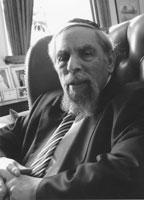
Louis Jacobs
Louis Jacobs CBE (17 July 1920 – 1 July 2006)[1] was a leading writer, Jewish theologian, and rabbi of the New London Synagogue in the United Kingdom. He was also the focus in the early 1960s of what became known as the "Jacobs Affair"[2] in the British Jewish community.
For other people named Louis Jacobs, see Louis Jacobs (disambiguation).
Louis Jacobs
17 July 1920
1 July 2006 (aged 85)
Sophie (Shulamit) (1921–2005).
Rabbi, writer and theologian
Rabbi
London, England
Early career[edit]
Jacobs was born in Manchester on 17 July 1920.[3][4][5] He studied at Manchester Yeshiva, and later at the kolel in Gateshead. His teachers included leading Rabbi Eliyahu Dessler. Jacobs was ordained as a rabbi at Manchester Yeshiva. Later in his career, he studied at University College London where he gained his PhD on the topic of The Business Life of the Jews in Babylon, 200–500 CE. Jacobs was appointed rabbi at Manchester Central Synagogue[6] in 1948. In 1954, he was appointed to the New West End Synagogue in London.
Jacobs became Moral Tutor at Jews' College, London, where he taught Talmud and homiletics during the last years of Rabbi Dr Isidore Epstein's tenure as principal. By this time, Jacobs had drifted away from the strictly traditional approach to Jewish theology that had marked his formative years. Instead, he struggled to find a synthesis that would accommodate Orthodox Jewish theology and modern day higher biblical criticism. Jacobs was especially concerned with how to reconcile modern-day Orthodox Jewish faith with the documentary hypothesis. His ideas about the subject were outlined in the book, We Have Reason to Believe, which was published in 1957. The work was originally written to record the essence of discussions held on its title's subject at weekly classes given by Jacobs at the New West End Synagogue, and resulted in some mild criticism (but not in any major censure) at the time.
The New London Synagogue[edit]
The defecting congregation purchased the old St John's Wood synagogue building, and installed Jacobs as its rabbi – a post which he held until 2001[17] and to which he returned in 2005. This congregation, The New London Synagogue, became the "parent" of the Masorti movement in the United Kingdom, which now numbers several congregations.[18]
While holding the position of rabbi at the New London Synagogue,[19] Dr Jacobs was also for many years Lecturer in Talmud and Zohar at the Leo Baeck College, a rabbinical college preparing students to serve as Masorti, Reform and Liberal rabbis in the UK and Europe. Rabbi Jacobs served as Chairman of the Academic Committee for some years.
When the Masorti Movement in Britain was created its founders asked him to be its spiritual guide. Despite his ambivalence about the need and purpose of a new movement, he agreed. But he refused to be regarded as its founder. He always described Masorti as a mood not a movement".[20]
Since the founding of the New London Synagogue, Jacobs and the Masorti movement were subject to hostility from Orthodox British Jewish institutions. On his 83rd birthday, in the Bournemouth United Synagogue on the sabbath before his granddaughter's wedding, Jacobs was not provided the honour of an aliyah customarily given to the father of the bride, which gave rise to heated correspondence in the Jewish press including accusations of pettiness and vindictiveness.[21] The Chief Rabbi, Lord Jonathan Sacks, and the head of the London Beth Din, Dayan Chanoch Ehrentreu, responded that, because of what they considered to be Jacobs's heretical beliefs, "they believed that had Jacobs uttered the words 'Our God […] who gave us the Torah of truth […] ', he would have made a false statement".[22]
Witness for Chabad-Lubavitch[edit]
Jacobs testified on behalf of the Chabad Lubavitch movement during the Chabad library controversy.[23] Being an acknowledged scholar on Chasidism, Jacobs was called as an expert witness to testify on the Chabad practice of "ma'amad" (support), the method by which the members of the Chabad community supported their Rebbe.
Jacobs testified that "[ma'mad] is a due, for which every member of the movement is expected to consider himself responsible, and ... there is an amount according to means which every member pays or is expected to pay. It is best compared to membership dues of a learned society or a sacred society, and the dues are expected as [a] token of membership." Jacobs noted that other Chasidic groups support their Rebbes by gifts known as "pidyon" (redemption) or "pidyon nefesh" (redemption of the soul) delivered personally to a rebbe. Pidyon is understood by Jacobs as "a personal gift, as it were ... for [spiritual] services rendered."[24]